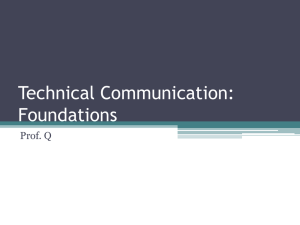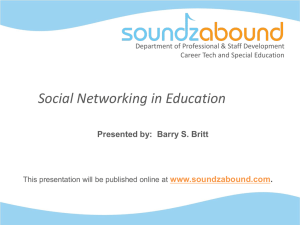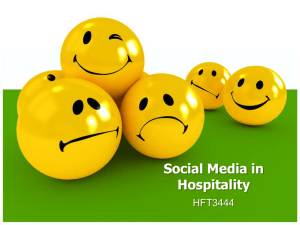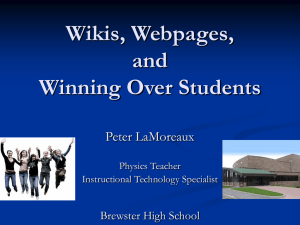PPT
advertisement
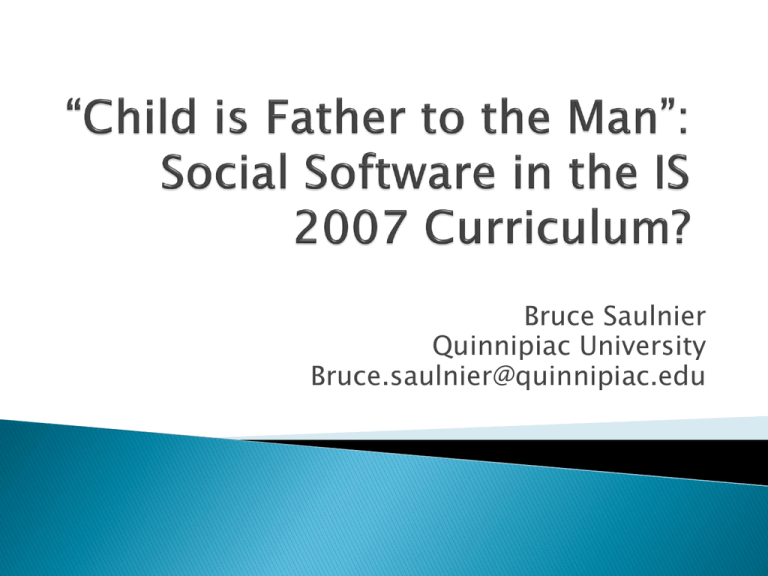
Bruce Saulnier Quinnipiac University Bruce.saulnier@quinnipiac.edu A Poem by Gerald Manley Hopkins (18441889) Theme – What we experience in childhood carries through to and influences what we become and how we behave as adults The title of the 1967 Debut album of the jazz rock group Blood, Sweat and Tears Significance of the Album ◦ Considered by many to be the first fusion of jazz instrumentation into the Rock music scene ◦ Paved the way for groups such as Chicago; Earth Wind, & Fire, etc. ◦ Title of album based on an unreleased cut from the Beachboys’ famous “Smile” Sessions Has been suggested by other literary critics to also mean – ◦ We learn from our children In this context, as our children grow up and move into the work place, they carry with them the skills they experience in childhood, thus altering our workplace norms The term Social software is normally applied to a range of web-enabled software programs. The programs usually allow users to interact, share, and meet other users. This computer-mediated communication has become very popular with sites like MySpace and YouTube and has resulted in large user bases and billion dollar purchases of the software and their communities by large corporations (News Corp purchased MySpace, Google purchased YouTube, and just last week Microsoft purchased a share of Facebook). The more specific term collaborative software applies to cooperative information sharing systems, and is usually narrowly applied to the software that enables collaborative work functions. Distinctions between usage of the terms "social" and "collaborative" are in the applications or uses, not the tools themselves, although there are some tools that are only rarely used for work collaboration. Should we in Information Systems Education be employing social software tools (blogs, wikis, YouTube, Face Book, etc.) both as ◦ Pedagogical (Teaching) Tools, and ◦ A Subject of Study “Shift Happens” http://www.youtube.com/watch?v=fhnWKg9B 2-8&NR=1 Kansas State University Digital Ethnography Project of the Introduction to Cultural Anthropology Course http://www.youtube.com/watch?v=dGCJ46vy R9o Given that the Millennials are growing up a wired generation and are used to virtually instant communication with social software tools, to what extent has their entry into the workforce changed the nature of workforce communication? During the spring, summer and fall of 2007 interviews have been conducted with over 40 MIS professionals from across the nation. Those interviewed to date represent a wide range of companies from sole proprietors (independent computer consultants who have a wide range of clients) to major corporations (Apple, IBM, Cisco, Aetna, etc.) and a wide range of industries (manufacturing, higher education, defense contractors, the insurance industry, computer producers, network services, etc.). Interviews have been conducted both in person and via the telephone and follow-up e-mail exchanges occurred with over 50% of those interviewed. There is a marked increased use of Text Messaging, Instant Messaging (IM) and multifunction Cell Phones in Business Communications; Wikis, softphones (VoIP), and blogs are increasingly used to build a sense of community in an increasingly geographically dispersed workforce; As a greater percentage of the workforce is telecommuting, the use of social software provides an effective means of socialization; The use of social software closes social distance by enabling remote and distributed employees to collaborate more effectively; The use of wikis to manage projects and for collaboration is rapidly increasing, especially so in the software development industry; For businesses in general there is an increasing use of MySpace as a marketing tool, wikis for project management and collaboration, and blogs to publish content. New graduates are frequently shocked by business norms, especially in terms of expectations for effective communication. While the graduates electronically communicate more in terms of sound bites and slang, business still expects high-quality written and oral communication skills; New graduates are frequently cited as being too dependent upon electronic communication, to the extent that it limits their ability to effectively communicate in person. The graduates do not realize the extent to which they must work effectively in team environments, both electronically and in person; New graduates frequently cite the information contained in blogs and wikis as evidence – they frequently are unable to distinguish what is published in a blog or wiki from reality; New graduates are not aware of professional standards for finishing work on time and within budget – they do not seem to understand that as a professional in today’s corporate community it’s about what you get done and the quality of the finished product, not about how many hours you worked on the project. Incorporate Web 2.0 topics into the Personal Productivity with IS Technology course. In particular, minimally include the use of blogs as a content authoring tool both on campus and in industry, and the use wikis as a group collaboration and problem-solving tool both on campus and in industry. In is imperative that we not just talk about these tools and their use as emergent technologies, but that we employ both blogs and wikis in delivering the course content. Introduce Web 2.0 topics into the Fundamentals of Information Systems course; Minimally, explore how the use of Facebook is changing the nature of information systems collaboration on campus and how the use of MySpace and YouTube are changing the face of industry information systems applications. We should explore the social implications of Facebook, MySpace, and YouTube by involving students in the construction of Facebook accounts, MySpace accounts, and YouTube production. Our students should actively learn by doing wherever and whenever possible. Address the issue of “student self-regulation” by employing an inquiry-based pedagogy consistent with current advances in student learning theory. In particular, construct questions of relevance to students and have students “discover” how information systems are used in solving problems of particular relevance to them. Doing these activities in project teams will further address the issue of student self-regulation as students respond to peer pressure to effectively perform their portion of the group activities. Increase “student motivation” by understanding the “hot cognition” theory which posits that students are motivated to learn if they are emotionally involved in the learning scenario. We can employ inquiry-based pedagogy to scenarios to which students can effectively relate such as constructing teaching/learning scenarios around their campus experiences. At the end of each section/chapter we can have students address how the topic just covered is relevant to them at this particular point in their lives. Assist students in transferring class content to their major and career interests by explicitly addressing how the topic applies to them now or as future business professionals. The author has found study guides addressing ethical issues to be particularly useful in this regard. Another technique that has proven effective is to have students address how the material just covered has increased their net worth as a potential employee and family member. In upper-level project-based courses, consistently employ Web 2.0 tools to deliver course content and have student teams use Web 2.0 tools to manage group projects. In particular, employ interactive course web pages, course blogs, and course wikis as content delivery mechanisms and have students use team-based wikis to manage projects. Numerous other ideas should come to mind upon minimally exploring these possibilities. Develop a department blog to support major recruitment efforts, a department blog to keep alumni and other stakeholders involved in the department activities, and a department wiki to enable alumni, potential student employers, and other stakeholders to actively participate in department planning activities. This will provide for greater stakeholder involvement in our department which will lead to greater stakeholder input to our department planning and assessment processes. Employing these techniques is also consistent with the premise that our students do not learn what we tell them; rather, they learn what we do. We should consistently employ Web 2.0 tools as a means of managing our department activities.
